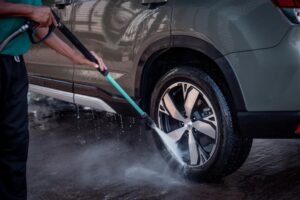PPF and Resale Value: Can Paint Protection Film Boost Your Car’s Market Value?

Specialist installs car paint protection film on hood. Transparent protective coating against chips and scratches
When considering the resale value of a car, owners often look at what can be done to maintain or even enhance their vehicle’s market appeal. Among various protective measures, paint protection films (PPFs) have gained popularity. Specifically, Proshield paint protection film is a product that claims to offer superior protection against the elements and everyday wear and tear, but how does it impact your car’s resale value?
Understanding Paint Protection Film
Paint Protection Film, or PPF, is a thin, clear, and durable film applied to the exterior of vehicles to protect the paint from scratches, chips, stains, and other environmental damages. This film is usually made from urethane or polyurethane, materials known for their exceptional strength and elasticity. The primary function of PPF is to shield the car’s paint without altering the original appearance of the vehicle.
Proshield Paint Protection Film and Its Benefits
Proshield paint protection film stands out due to its high-quality material and advanced technology. It provides a strong barrier against road debris, bird droppings, and UV rays, which can cause fading and oxidation to car paint over time. By preserving the original paintwork, PPF like Proshield helps maintain the aesthetic appeal of the vehicle, which is a significant factor in the resale value.
Impact on Resale Value
The direct impact of Proshield paint protection film on resale value can be substantial. A well-maintained car exterior free from blemishes and scratches tends to attract more buyers and can often command a higher price. From a buyer’s perspective, a car treated with PPF suggests that the owner has taken good care of it, thereby reducing potential concerns over hidden defects.
Moreover, the application of PPF could be seen as an investment in the car’s longevity. Vehicles with PPF tend to have better-preserved exteriors, which is a critical aspect during resale evaluations. Dealers and individual buyers are likely to appreciate the reduced need for paint jobs and detailing, which otherwise could incur considerable expense.
Considerations Before Applying PPF
While PPF offers clear benefits, there are several factors to consider:
- Cost: The initial cost of applying Proshield paint protection film can be relatively high. Car owners need to evaluate if the potential increase in resale value justifies this expense.
- Quality of Installation: The effectiveness and longevity of PPF heavily depend on the quality of installation. Poorly applied film might peel off or trap dirt, detracting from the car’s appearance rather than enhancing it.
- Maintenance: Although PPF is low maintenance, it requires proper care, including regular cleaning and avoidance of abrasive materials during washes to prevent peeling or scratches on the film itself.
Conclusion
In conclusion, Proshield paint protection film can be a worthwhile addition for car owners looking to boost their vehicle’s resale value. It protects the paintwork effectively, thereby preserving the car’s aesthetic appeal—a crucial determinant in the second-hand market. However, owners should weigh the cost and ensure professional installation to maximize the potential benefits.








